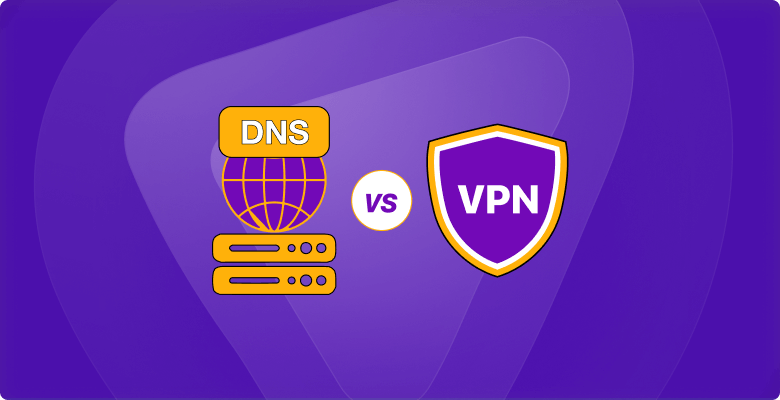Want to access geo-locked content from anywhere in the world? You can use either Smart DNS or a VPN to help you with that.
Smart DNS is essentially a proxy server, which upon connection, allows you to access any content of your choice. A VPN, on the other hand, is more complex and redirects your data through a secure “tunnel” that encrypts it. Yes, that means you can use it to access your preferred content as well.
When you watch movies and TV shows online, you’ll frequently come across geo-locked content. Take, for instance, you can only stream ABC videos from the US. Similarly, BBC iPlayer isn’t available outside the UK, and you’ll also find that Netflix’s content library differs significantly from one country to another.
This practice is referred to as geo-locking, and it understandably causes a great deal of frustration among streamers. Luckily, the aforementioned methods can be used to circumvent these pesky barriers so that you can stream what you want.
Here, we’re going to explore how both options are different as well as the advantages and advantages they bring to the table. However, before talking about Smart DNS vs. VPN, take a look at these basic definitions below to clear any confusion between Smart DNS and DNS.
What is DNS?

DNS (Domain Name System) is the Internet’s equivalent of a telephone book. When you access a website via human-friendly domain names such as “www.PureVPN.com” what DNS does is find the corresponding IP address. Your browser can then communicate with the right server to retrieve the site and its content.
These IP addresses are stored on DNS servers so that you don’t have to remember them. Since there are literally millions of them in use, the Internet as we know and love today would be a complicated mess without DNS.
What is a VPN?

A VPN (Virtual Private Network) is a technology that adds a layer of protection to your online activities while using private and public networks, like the Internet or WiFi hotspots. Basically, it establishes an encrypted tunnel between your device and a remote server maintained by the VPN provider.
Since your traffic is routed through this secure connection, your data becomes indecipherable to third-parties such as ISPs or governments. Moreover, your device is also assigned the IP address of the chosen VPN server, spoofing your actual identity and location. This makes it possible to access websites and content unavailable in your region.
Pros of a VPN
- Establishes a secure, encrypted connection between your device and the internet, protecting your traffic from third-party monitoring.
- Replaces your real IP address with a new one from the VPN server network, making it difficult to track your online activities.
- Easy-to-use VPN apps facilitate a quick and uncomplicated setup process.
- Offers additional features such as a kill switch, obfuscation, and DNS leak protection for enhanced security.
- Capable of unblocking most geo-restricted streaming services without detection.
Cons of a VPN
- Encryption and decryption processes may potentially result in slower speeds.
- Generally costs more than a smart DNS service, though prices are much more level now.
What is Smart DNS?
Smart DNS is a service that helps you get around geo-locks to access the content of your choice. It essentially replaces your ISP-provided DNS address with another one from a company-owned DNS and redirects portions of your traffic to a proxy server.
With your device’s DNS changed, websites will be tricked into thinking that you’re browsing from an eligible location. Nevertheless, it’s important to understand that Smart DNS doesn’t encrypt your traffic or assign you a new IP address – it merely changes the way websites view your IP!
Pros of Smart DNS
- Fast and lightweight since encryption is not used on your traffic.
- Provides easy access to geo-restricted content.
- Simple and hassle-free setup process.
Cons of Smart DNS
- Leaves your internet traffic exposed due to lack of encryption.
- Ineffective in bypassing geo-blocks on some streaming platforms.
- Does not offer any privacy and anonymity.

Smart DNS vs. VPN
Though Smart DNS services and VPNs function quite differently, both are effective when it comes to giving you access to geo-locked content. However, which one is the best for you? That, of course, will depend on your specific needs.
So, let’s compare Smart DNS vs. VPN and leave you to make the choice:
1. Price
You’ll hear a lot of people saying that Smart DNS is more budget-friendly than VPNs, but this isn’t always true. A yearly subscription from a popular Smart DNS service, for instance, will set you back by $4.16 per month.
VPNs, on the other hand, can be purchased for the same price or even cheaper. In fact, some are also known to offer exclusive deals and discounts from time to time, helping you save some extra bucks.
2. Security
VPNs not only provide a way to avoid geo-locks but also excellent privacy and security. This is important because disguising your location is against the TOS (Terms of service) of most websites, and you wouldn’t want to violate them. Having your IP address hidden and traffic encrypted with a VPN means you don’t have to worry about getting penalized.
Smart DNS offers no security whatsoever. It lets you gain access to geo-locked content without any end to end encryption or IP address masking, which is enough for some users who don’t need or want these security features. But an additional layer of protection is always recommended when engaging in such online activities.
3. Accessibility
You might be wondering, “Which websites work with SmartDNS and VPNs?” Most entertainment lovers around the world want to access US Netflix. However, the streaming giant has been clamping down on the use of VPNs and Smart DNS services to evade their geo-locks.
The truth is, not all VPNs and Smart DNS services are created equally – some work with popular streaming services like Netflix, and some don’t! As such, you should investigate multiple providers to see which are capable of working with the content that you wish to access.
4. Setup and Configuration
Both of these options are very simple to set up. For Smart DNS, you need to delve into your network settings and make some changes. As far as VPNs are concerned, you have to install the application from your provider on your device. Then, connect to a VPN server, and that’s about it.
5. Speed
Since Smart DNS doesn’t involve encryption, you’ll be able to enjoy the seamless streaming of your preferred content. The speed of a VPN connection is indeed impacted by the encryption process that takes place. But high-quality VPNs usually have workarounds for this and are fast enough to support HD viewing.
Frequently Asked Questions
How can I choose the best DNS to use?
Choosing a different DNS provider allows you to address privacy concerns associated with ISP-provided DNS servers. Consider factors such as privacy, speed, server infrastructure, protection against threats, and customer support when selecting a DNS service. However, finding a DNS service that excels in all these areas can be challenging.
Is Smart DNS Better Than a VPN?
Nope. A VPN is more flexible as a service and does almost everything (streaming geo-restricted content, bypassing firewalls, security, etc.) better than Smart DNS does.
Smart DNS vs. VPN – Which Is Best For Streaming?
Smart DNS will allow you to stream unavailable content faster and on almost every platform out there. However, there are certain websites and services that you won’t be able to access using smart DNS alone – you won’t face that problem when using a VPN!
Smart DNS vs. VPN – Which Is Best For Bypassing Firewalls?
Smart DNS can’t get around IP blocks put in place by the school and office networks, but a VPN is capable of that and much more.
Conclusion – Smart DNS or VPN?
All in all, you get the most bang for your buck with VPNs as they offer foolproof protection besides the ability to circumventing geo-locks. Smart DNS might be better suited to those users who aren’t concerned about security and privacy and just want to stream unavailable content.
If you’ve made it this far and are thinking about getting a VPN, we’ve got you covered! PureVPN boasts a global network of 6,500+ VPN servers and 300,000+ IPs for complete online accessibility and is packed with useful features like military-grade encryption, kill switch, and WebRTC leak protection.



